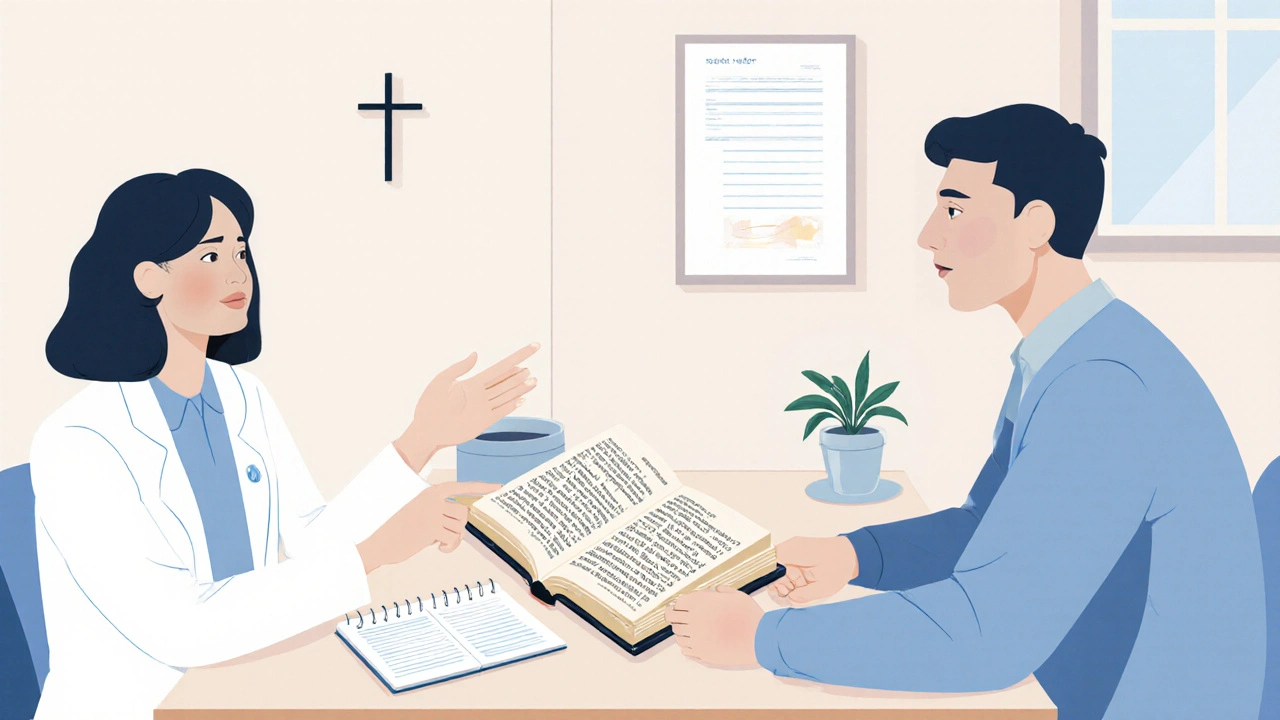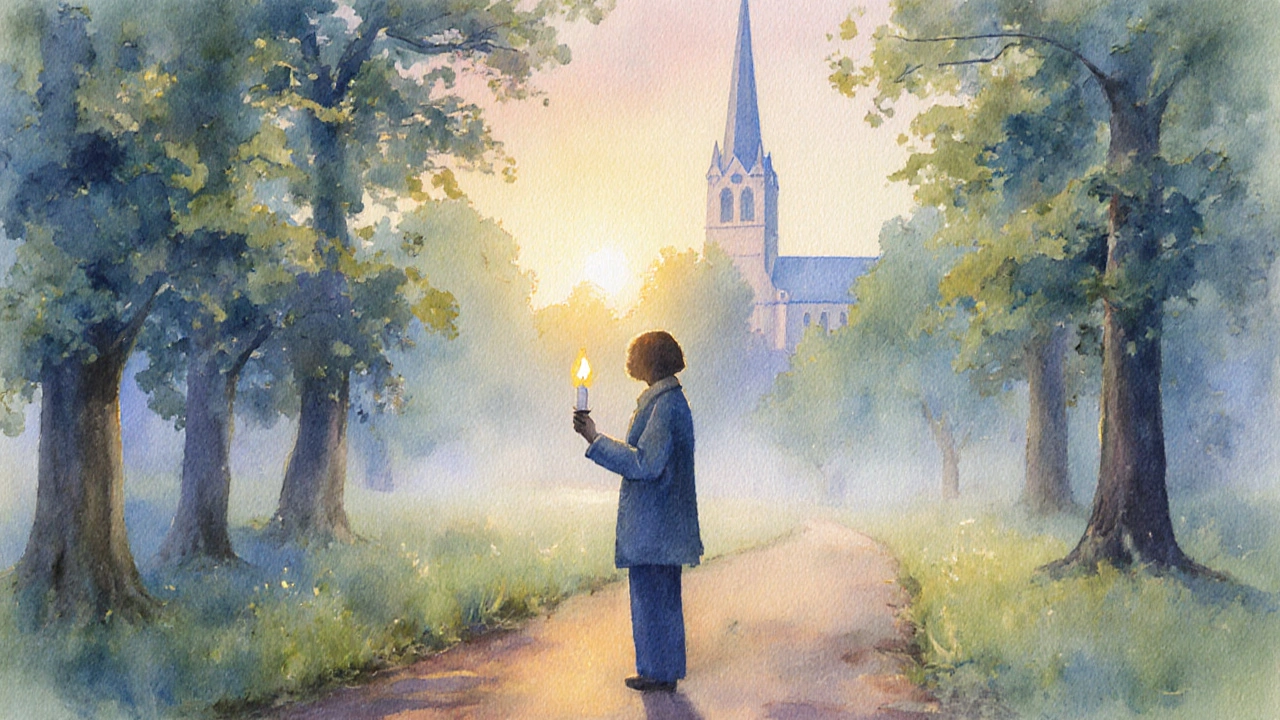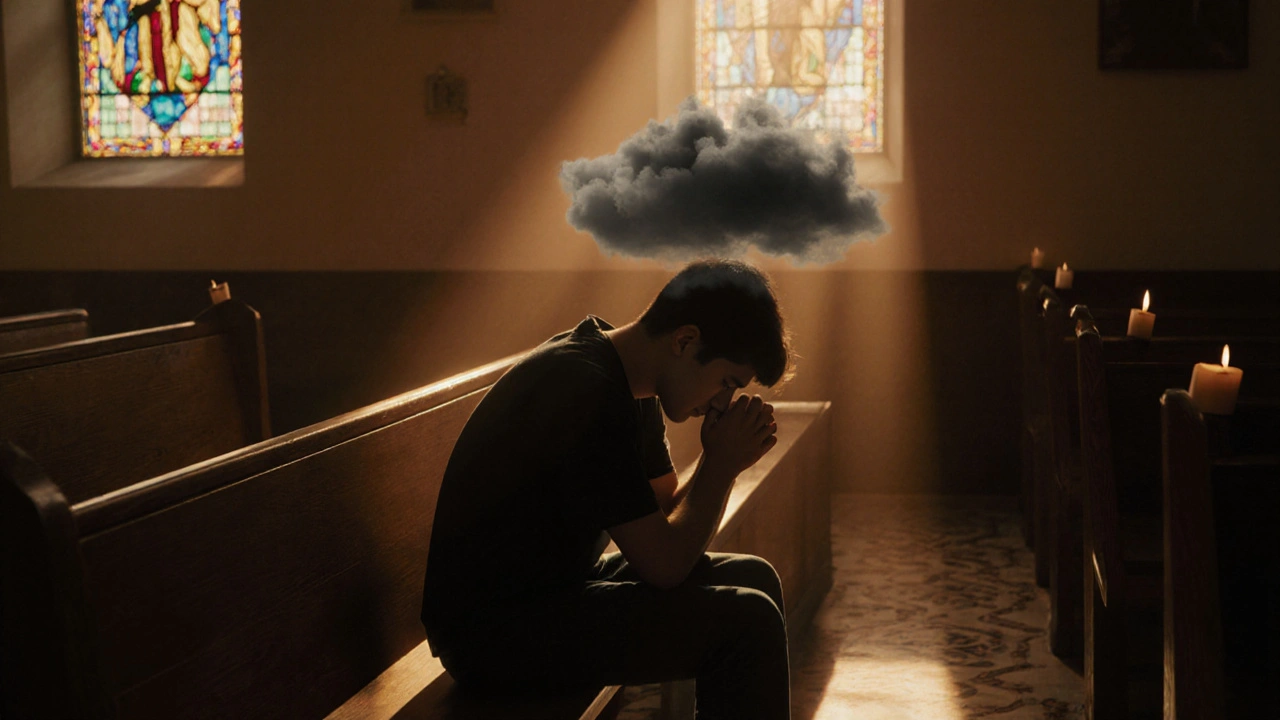Scrupulosity Assessment Tool
Religious OCD Assessment
This tool helps identify signs of scrupulosity - a form of OCD that targets religious or moral beliefs. Based on clinical guidelines, answer the following symptoms that may indicate religious-focused OCD. Your responses will be kept private.
Check all symptoms that apply to you:
Your Assessment Results
Total symptoms checked: 0
Key Takeaways
- OCD can twist spiritual practices into sources of anxiety rather than comfort.
- Scrupulosity is the form of OCD that targets religious thoughts and rituals.
- Therapies such as CBT and ERP work well when they respect a person’s faith.
- Open dialogue with clergy and mental‑health providers reduces guilt and isolation.
- Early professional help prevents the spiral of compulsive religious behaviors.
What is Obsessive‑Compulsive Disorder?
When discussing mental health, Obsessive‑Compulsive Disorder is a chronic anxiety condition marked by unwanted, repetitive thoughts (obsessions) and ritualistic actions (compulsions). It affects roughly 2‑3% of the global population and shows up in many shapes - from checking the stove dozens of times to arranging objects in a precise order.
Two core components drive the disorder:
- Obsessions: intrusive, distressing images or ideas that seem impossible to ignore.
- Compulsions: mental or physical actions performed to neutralize the anxiety caused by obsessions.
These cycles can dominate daily life, but they become especially tangled when they touch on deeply held beliefs.
When OCD Meets Spirituality and Religion
Spirituality and religion are sources of meaning for many, yet OCD can hijack those very practices. The brain’s error‑detection system, already overactive in OCD, may label a moral or sacred thought as a threat. The result is a flood of doubt about one’s faith, leading to compulsive prayers, confession rituals, or even avoidance of worship spaces.
Two concepts explain this crossover:
- Scrupulosity is the term clinicians use for OCD that fixates on religious or moral themes. It can manifest as an incessant need to be "perfectly" pious.
- Intrusive thoughts are unwanted mental images or ideas that clash with a person’s values. In a religious context, these may include blasphemous images or fears of being condemned.
Both can erode confidence in one’s faith and turn worship into a source of dread.

Typical Signs of Religious‑Focused OCD
Recognizing the pattern helps prevent it from spiraling. Look for these red flags:
- Compulsive prayer that must be repeated a specific number of times before feeling “clean.”
- Excessive confession, even for minor or imagined sins.
- Avoidance of religious texts or services for fear of encountering “dangerous” ideas.
- Persistent guilt after neutral thoughts about God, morality, or sacred symbols.
- Ritualized reading of scriptures until the page feels "right," often accompanied by anxiety if interrupted.
These behaviors differ from devout practice because they are driven by anxiety relief, not sincere devotion.
Therapeutic Approaches That Respect Faith
Standard OCD treatment works, but when faith is involved, therapists often adapt techniques to avoid spiritual alienation.
- Cognitive Behavioral Therapy is a structured talk therapy that challenges distorted thoughts and replaces compulsive actions with healthier coping strategies. In a religious setting, CBT can incorporate scriptural references that reinforce rational thinking.
- Exposure and Response Prevention is a specialized CBT method where patients deliberately face feared thoughts without performing the associated compulsion. For scrupulosity, exposure might involve reading a passage that triggers guilt and resisting the urge to re‑prayer.
- Mindfulness practices drawn from the same spiritual tradition can calm the brain’s alarm system without contradicting belief.
- Pastoral counseling works best when clergy understand OCD’s neurobiological roots and refer congregants to mental‑health professionals.
Combining these methods often yields the quickest relief because the person feels both psychologically and spiritually heard.
Practical Tips for Those Living with OCD and Faith
- Label the urge. When a compulsive prayer pops up, name it “OCD‑driven” before deciding whether to act.
- Set a realistic limit. If you normally pray five times a day, decide on a maximum and stick to it, even if anxiety spikes.
- Lean on trusted allies. Share your struggles with a pastor who respects mental‑health treatment or a therapist familiar with religious concerns.
- Use evidence‑based scriptures. Find verses that emphasize grace and forgiveness; let them counteract the guilt loop.
- Schedule regular check‑ins. Weekly or bi‑weekly appointments keep the OCD cycle from regaining momentum.
These steps empower you to keep faith as a source of comfort, not conflict.

When to Call a Professional
If any of the following occur, reach out immediately:
- Compulsions consume more than an hour each day.
- Thoughts of divine punishment lead to severe depression or suicidal ideation.
- Relationships strain because loved ones feel you’re “too religious” or “obsessed.”
- Physical health suffers from neglect due to ritualistic behaviors (e.g., skipping meals for fasting rituals).
Early intervention can halt the deepening of scrupulosity and restore a healthier balance between belief and wellbeing.
Comparison: General OCD vs. Scrupulosity
| Aspect | General OCD | Scrupulosity |
|---|---|---|
| Primary obsession theme | Contamination, symmetry, hoarding | Sin, blasphemy, moral purity |
| Typical compulsion | Washing, arranging, checking | Excessive prayer, confession, ritual reading |
| Trigger location | Any environment | Places of worship, sacred texts |
| Emotional fallout | Shame, frustration | Guilt, spiritual terror, fear of divine judgement |
| Therapeutic nuance | Standard CBT/ERP | CBT/ERP plus faith‑sensitive framing |
Bottom Line
The intersection of OCD and spirituality is a real challenge, but it’s manageable. By recognizing scrupulosity, seeking evidence‑based treatment, and involving supportive faith leaders, people can keep their religious life enriching rather than exhausting.
Frequently Asked Questions
Can OCD make me lose faith?
It can feel that way because the disorder turns prayer and worship into anxiety triggers. However, with proper therapy, many people restore a healthier, more authentic connection to their beliefs.
Is scrupulosity a separate diagnosis?
No. Scrupulosity is a subtype of OCD focused on religious or moral content. It appears in the DSM‑5 under obsessive‑compulsive and related disorders.
Will my pastor be able to help with my OCD?
A pastor can provide spiritual support, but it’s essential to involve a mental‑health professional trained in CBT or ERP. Collaboration between clergy and therapist yields the best outcomes.
Are there faith‑based OCD support groups?
Yes. Many organizations, such as the International OCD Foundation, list faith‑sensitive groups. Local churches sometimes host mental‑health workshops that respect both clinical and spiritual perspectives.
How long does treatment take?
The length varies. Some individuals see significant reduction in symptoms after 12‑16 weeks of weekly CBT/ERP, while others may need longer, especially if they’re integrating deep‑seated religious beliefs.





Angela Allen
October 13, 2025 AT 16:43Hey, reading about scrupulosity really hits home. I think it's super important to remind ourselves that seeking help doesn't mean we're weak, it just means we're human. If you ever feel overwhelmed, talking to a therapist who respects your faith can be a game changer. You definitely aren't alone in this, and there's a community out there that gets it.
Justin Valois
October 29, 2025 AT 20:36Man, this whole OCD deal with religion is like a mental battlefield, bro. People act like they've got some secret divine code they gotta follow to the dot, and any tiny slip feels like world war. It's absurd, yet it's real for a lot of folks. You gotta break the cycle before it burns you to ash.
Jessica Simpson
November 15, 2025 AT 01:29I've seen this in some of the communities I visit, and it's a tricky blend of cultural expectation and personal anxiety. The way the mind can latch onto rituals as a safety net is fascinating, even if it's painful. It's worth exploring how different faith traditions support or unintentionally reinforce these patterns. Always good to keep a curious mind about how belief & mental health intersect.
Ryan Smith
December 1, 2025 AT 06:23Oh great, because the universe totally wants us to micromanage every prayer like a CIA operation. Sure, faith can be a comfort, but when it turns into a surveillance state in your head, that's where the fun stops.
John Carruth
December 17, 2025 AT 11:16When we talk about the impact of OCD on spirituality, it's essential to recognize that the ritualistic aspect of many religious practices can become a double-edged sword. On one hand, the structure provides a comforting framework that can help individuals anchor themselves amidst life's chaos, offering a predictable rhythm that can be soothing. On the other hand, for someone grappling with scrupulosity, that same structure can morph into an oppressive regime, where the mind feels compelled to perform every prayer, confession, and rite with flawless precision, fearing divine retribution for the slightest deviation.
Consider the case of repetitive prayer: what might start as a heartfelt expression can quickly evolve into a compulsive tally, where the individual must repeat a specific number of prayers before feeling "clean" or worthy. This can lead to severe exhaustion, both mental and physical, as the person loses sight of the deeper purpose of their devotion. The same phenomenon appears in scripture reading, where the passage must be read until the page "feels right," often resulting in anxiety if interrupted, as if the sacred words are somehow incomplete without the exact ritual.
These compulsions also infiltrate moral judgments, amplifying guilt over neutral thoughts and inflating the fear of divine punishment. The result is a perpetual loop of checking, rechecking, and self-critique, which can erode the very sense of peace that spirituality aims to cultivate. Over time, individuals may start avoiding religious spaces entirely, not out of loss of faith, but as an act of self-preservation to escape the relentless pressure of perfection.
Therapeutic approaches need to be sensitive to these nuances. Cognitive-behavioral strategies, especially exposure and response prevention (ERP), can help break these cycles, but only if the therapist respects the individual's belief system and frames the treatment in a way that aligns with their values. Integrating faith-based counseling, perhaps with the aid of clergy who understand mental health, can bridge the gap, ensuring the person does not feel torn between their spirituality and mental well‑being.
Ultimately, the goal is to restore a balanced relationship with faith-one where rituals are meaningful rather than mandatory, where guilt is replaced with compassion, and where divine love is felt as accepting rather than punitive.
Melodi Young
January 2, 2026 AT 16:09Well, gotta say the whole "I’ve read every scripture twice because I’m scared it won’t be right" vibe is a bit over the top. Sure, dedication is great, but when it turns into obsessive checking, you’re just feeding the OCD monster. Maybe tone down the anxiety and let the words speak for themselves, yeah?
Tanna Dunlap
January 18, 2026 AT 21:03From an ethical standpoint, the idea that one must achieve an impossible standard of holiness is a dangerous narrative. It breeds a culture of shame and self‑flagellation that does nothing but entrench the individual deeper into the grips of anxiety. The moral scaffolding should instead emphasize humility and forgiveness, not relentless perfection. When you start fearing divine retribution for the tiniest misstep, you lose the essence of genuine faith.
Troy Freund
February 4, 2026 AT 01:56It's fascinating how the mind can turn a spiritual practice into a mental treadmill. I think stepping back, breathing, and just being present can help untangle some of those compulsions. Finding a balance between reverence and relaxation might be the key.
michael Mc Laughlin
February 20, 2026 AT 06:49Great info thanks